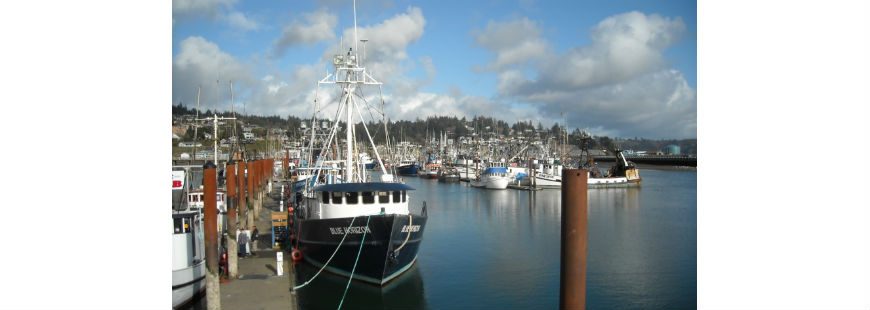U.S. Representatives Chellie Pingree (D-Maine) and Rob Wittman (R-Va.) have reintroduced the bipartisan Keep America’s Waterfronts Working Act, H.R. 6641.
The legislation establishes a Working Waterfront Grant Program to help preserve and expand access to coastal waters for water-dependent businesses, create a Working Waterfronts Preservation Loan Fund to make funds available through state governments for working waterfront improvement projects, and establish a Working Waterfront Task Force at the Department of Commerce to identify and prioritize critical needs for working waterfronts and to address the impacts of climate change.
The Keep America’s Waterfronts Working Act addresses the needs of our nation’s vulnerable working waterfronts and coastal fishing communities while supporting our blue economy nationwide. It provides necessary resources for restoring and maintaining waterfront infrastructure and ensuring waterfront access for commercial businesses, recreation, and tourism. This bill also takes steps to ensure participation from Indigenous peoples recognizing traditional uses of coastal and ocean resources.
The Keep America’s Waterfronts Working Act would provide significant benefits to coastal communities, local jobs, and regional economies by supporting the people who depend on ocean access for their livelihoods.
“More than 30,000 Mainers rely on marine-related industries for their livelihoods. Yet out of 5,000 miles of coastline in Maine, just about 20 miles of working waterfronts remain. Working waterfronts are rapidly disappearing nationwide due to heavy development pressure. When fishermen must grapple with the loss of wharves, processing facilities, and other essential infrastructure in addition to navigating the challenge of climate change, it threatens the very survival of our coastal communities,” said Rep. Pingree. “Throughout my tenure in Congress, I have been proud to work across the aisle with my colleagues to create bipartisan solutions that can work for America’s coastal communities. My and Congressman Wittman’s bipartisan Keep America’s Waterfronts Working Act will help reverse a worrying trend of shrinking waterfronts, while simultaneously protecting jobs and preserving the character of our coastal communities. Working waterfronts are an integral part of our coastal economies, communities, and traditions. We must do our part to ensure they survive into the future.”
“Deteriorating waterfronts don’t just hurt the American economy; they hurt the bedrock of our coastal communities, particularly in Virginia’s 1st District. These waterfronts support our local businesses, offer recreational access to water, and enhance the quality of life for so many people. Unfortunately, population growth and development threaten Virginia’s water-dependent industries and the families deeply rooted in our region’s cultural heritage,” said Rep. Wittman. “The Keep America’s Waterfronts Working Act is a vital safeguard, shielding coastal communities by bolstering the maritime industry, preserving jobs, and preserving our natural resources. I’m proud to partner with Congresswoman Pingree on this critical piece of bipartisan legislation.”
Besides Reps. Pingree and Wittman, the legislation was co-sponsored by Reps. Jared Golden (D-Maine), Jared Huffman (D-Calif.), Derek Kilmer (D-Wash.), Joseph Pallone (D-N.J.), Bill Keating (D-Mass.), James Moylan (R-Guam), and Val Hoyle (D-Ore.).
According to Rep. Pingree’s website, here are some details about the legislation. The bill:
- Establishes a Working Waterfronts Grant Program to provide matching, competitive grants to coastal states, Tribes, and Native Hawaiian Organizations to help preserve and expand access to coastal waters for water-dependent businesses.
- Creates a loan fund for working waterfronts preservation, modeled after state drinking water loans.
- Authorizes $50 million each for both the loan and grant programs.
- Organizes a Working Waterfronts Task Force at the Department of Commerce to identify and prioritize critical needs for working waterfronts, especially in the face of the climate crisis and increased trade threats.
One significant change from the version of the bill introduced in the previous Congress is that H.R. 6641 raises the amount of money available for the grants and the loan program from $15 million to $50 million for each. In recognition of the increasing impacts of climate change or other threats to working waterfronts, the bill adds the option for local vulnerability assessments, hazards resilience plans, or identification of waterfront properties exposed to sea level rise or inundation to proposed working waterfront plans. These changes reflect the magnitude of the challenges facing these communities.
Legislation like this, and Senator Collins’s “Working Waterfront Preservation Act,” when accompanied by measures to sustain and increase the abundance of our nation’s fisheries, ensure the health and sustainability of coastal communities and their fishing businesses for generations to come. The legislation passed the House in the 116th Congress but did not move in the U.S. Senate. Hopefully, some form of legislation like this will be enacted this Congress.
Photo: Harbor in Newport, Oregon, via Wikipedia.


